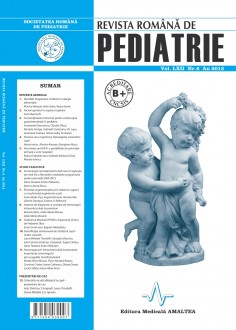SELECT ISSUE

Indexed

| |

|
|
|
| |
|
|
|

|
|
|
|
|
|
|
HIGHLIGHTS
National Awards “Science and Research”
NEW! RJP has announced the annually National Award for "Science and Research" for the best scientific articles published throughout the year in the official journal.
Read the Recommendations for the Conduct, Reporting, Editing, and Publication of Scholarly work in Medical Journals.
The published medical research literature is a global public good. Medical journal editors have a social responsibility to promote global health by publishing, whenever possible, research that furthers health worldwide.
INFORMED CONSENT IN PEDIATRIC GASTROINTESTINAL ENDOSCOPY
Smaranda Diaconescu, Claudia Olaru, Nicoleta Gimiga, Gabriela Ciubotariu, Valeriu V. Lupu, Anamaria Ciubara, Felicia Galos and M. Burlea
ABSTRACT
Informed consent has become a major, but also mandatory component in medical praxis nowadays. A great number of forums and publications emphasize its ethical and psychological commands, the most adequate way to obtain it and especially its legal implications. In pediatrics, the implications of this procedure are complex, sometimes confusing or not well understood. Thus, in clinical consultations or simple medical acts, the consent could be seen as implicit; when we talk about manoeuvres that lead to psychological or physical discomfort, invasive investigations, including endoscopy or therapeutical acts with possible risks or complications, informed consent from parents or legal tutors, respectively an intellectually, psychologically and socially evolved, educated child’s consent (acceptance) becomes mandatory. We must, however, clarify the nuances between consent and acceptance, not only from the semantic point of view, the proportion of either of the two terms in the final decision, the minor patient’s ability to discern at different age stages and finally the role and the importance of the doctor in such decision makings.
Key words: informed consent, gastrointestinal endoscopy
